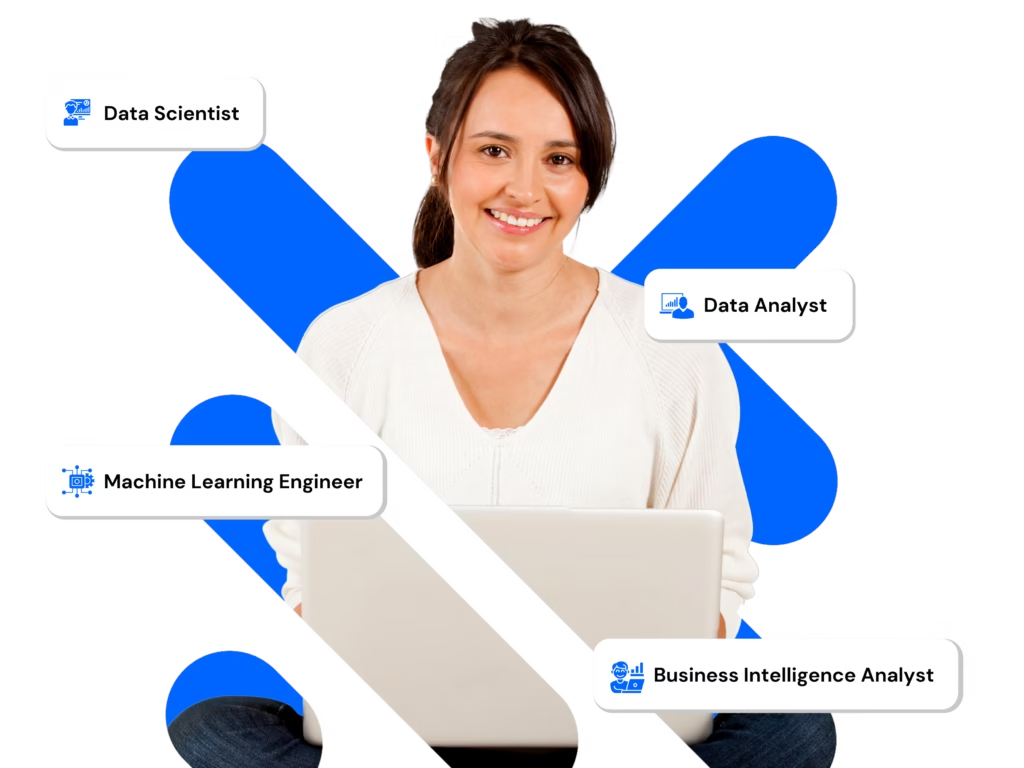Introduction to Data Science and Data Analytics

Data Science and Data Analytics are two integral fields within the broader domain of data analysis that focus on extracting meaningful insights and value from vast amounts of data. Although often used interchangeably, the two have distinct approaches, scopes, and objectives. Data Science encompasses a broader, more advanced framework, leveraging complex algorithms, predictive modeling, artificial intelligence (AI), and machine learning (ML) to derive deep insights and forecast future trends. It combines statistical techniques with programming and domain expertise to build sophisticated data models.
On the other hand, Data Analytics is more targeted and descriptive, cantering around understanding historical data and uncovering patterns through statistical techniques, visualization tools, and data querying. While Data Science focuses on what will happen, Data Analytics is more concerned with what has happened.
Both disciplines are pivotal in modern organizations, enabling smarter decision-making and strategic planning across industries. Data Science courses in Dehradun and Data Analytics courses in Dehradun are in high demand as professionals in these fields play a crucial role in helping businesses interpret data and optimize performance. These courses equip students with the necessary tools and techniques to pursue careers in these rapidly growing sectors, offering both theoretical knowledge and practical applications that are crucial for a successful career in data analysis.
What’s the Difference between Data Science and Data Analytics
Key Differences in Methodology and Approach

| Aspect | Data Science | Data Analytics |
| Objective | Predict future outcomes, build intelligent systems | Understand past trends, diagnose issues |
| Approach | Explorative, experimental, and algorithm-driven | Descriptive and diagnostic, business-question oriented |
| Techniques Used | Machine learning, deep learning, AI, statistical modeling | Statistical analysis, data summarization, trend identification |
| Data Type | Structured, semi-structured, and unstructured (e.g., images, text, logs) | Primarily structured data (e.g., databases, spread sheets) |
| Tools and Technologies | Python, R, TensorFlow, PyTorch, Scikit-learn, Hadoop, Spark | SQL, Excel, Tableau, Power BI, Google Data Studio |
| Model Focus | Predictive and prescriptive modeling | Descriptive and diagnostic analytics |
| Outcome | Forecasts, intelligent automation, and data-driven systems | Business reports, performance summaries, actionable insights |
| Use Cases | Fraud detection, recommendation systems, predictive maintenance | Sales analysis, customer segmentation, operational reporting |
| Complexity Level | High requires advanced knowledge of algorithms and computing | Moderate requires understanding of statistics and domain knowledge |
| Data Volume | Handles big data and massive datasets | Generally works with moderate to large datasets |
Application Areas and Industry Relevance
What is the Role of Data Science in Business Intelligence?
Data Science is revolutionizing a wide range of industries through its ability to process massive volumes of data and extract actionable insights using advanced algorithms, machine learning models, and artificial intelligence techniques. In the healthcare sector, data science has enabled ground-breaking innovations such as predictive diagnostics, where patient data is used to forecast potential health risks before symptoms appear.
Hospitals use machine learning algorithms to tailor personalized treatment plans and assist doctors with clinical decision-making by analyzing medical imaging data through AI-powered tools. These capabilities significantly enhance patient outcomes and operational efficiency in healthcare facilities. In the finance industry, data scientists develop robust models for credit scoring, fraud detection, and automated trading.
For example, machine learning algorithms can detect unusual spending patterns and flag fraudulent transactions in real time, thereby protecting both banks and customers. Additionally, data-driven investment strategies powered by AI are widely used for high-frequency and algorithmic trading, enabling financial institutions to optimize their portfolio management. In marketing, data science plays a pivotal role in customer segmentation, campaign optimization, and sentiment analysis.
Businesses can analyze vast amounts of social media data to gauge public opinion, tailor advertisements based on predicted customer preferences, and calculate customer lifetime value to focus efforts on high-return segments. Furthermore, industries like manufacturing, logistics, and transportation benefit from predictive maintenance models that anticipate equipment failures, route optimization algorithms that reduce fuel costs, and inventory forecasting systems that enhance supply chain efficiency.
Overall, the power of data science lies in its ability to harness big data to automate complex decision-making, uncover hidden patterns, and deliver predictive insights that drive innovation and growth. For individuals aiming to build a career in this dynamic field, data science courses in Dehradun and data analyst courses in Dehradun provide comprehensive training in the essential tools, technologies, and real-world applications needed to excel in today’s data-driven industries.
What is the Role of Data Analytics in Business Intelligence?
Data Analytics serves as the foundation for informed decision-making across industries by focusing on interpreting historical data, uncovering trends, and delivering actionable insights through descriptive and diagnostic methods. In the realm of business intelligence (BI), data analytics empowers companies to monitor key performance indicators (KPIs), track operational metrics, and visualize performance through interactive dashboards and reports. These tools enable decision-makers to evaluate the health of their organization in real time and make strategic adjustments based on data-backed evidence.
In customer behavior analysis, particularly within the e-commerce and retail sectors, businesses use data analytics to study purchasing patterns, predict customer churn, and develop targeted marketing strategies. By segmenting customers based on their behavior and preferences, companies can personalize product recommendations, promotions, and communication, thereby enhancing the customer experience and increasing retention rates.
Market research firms also rely heavily on data analytics to interpret survey data, analyze brand sentiment, and identify market trends. This information is essential for crafting effective advertising strategies, launching new products, and positioning brands competitively. Furthermore, industries like logistics and supply chain management utilize analytics to streamline inventory levels, reduce delivery delays, and improve supplier performance through performance metrics analysis.
In the public and education sectors, data analytics supports program evaluation, resource allocation, and policy-making by providing insights into effectiveness and outcomes. For example, educational institutions may use analytics to track student progress and tailor interventions, while government agencies use it to monitor and improve public services. With the increasing demand for analytics professionals, enrolling in a data analyst course in Dehradun offers a practical path to acquiring these in-demand skills. Likewise, individuals looking to enhance their capabilities in data modeling and predictive analysis can explore data science courses in Dehradun to gain a deeper understanding of the tools and techniques that drive organizational success.
Career Paths in Data Science

| Role | Key Responsibilities | Skills/Tools Involved |
| Data Engineer | Builds and maintains data infrastructure and pipelines | SQL, Python, Spark, Hadoop, Airflow |
| Machine Learning Specialist | Develops and deploys ML models for predictive tasks | Scikit-learn, TensorFlow, Python, ML algorithms |
| AI Researcher | Conducts advanced AI/ML research, often in academic or R&D settings | PyTorch, Deep Learning, NLP, Research papers |
| Data Science Manager / CDO | Leads data science teams, aligns data with business strategy | Leadership, Data Strategy, Communication |
| Other Roles (e.g., NLP Specialist, Deep Learning Engineer) | Specialized roles in specific data science subfields | Python, Keras, BERT, CNN/RNN, Domain knowledge |
Career Opportunities in Data Analytics
| Role | Key Responsibilities | Skills/Tools Involved |
| Business Analyst | Translates data insights into business strategy recommendations | Excel, SQL, Tableau, Business Acumen |
| Marketing Analyst | Analyzes campaigns, customer behavior, and market trends | Google Analytics, Excel, R, Power BI |
| Operations Analyst | Improves processes, analyzes workflows, boosts efficiency | Process Mapping, Data Visualization, Excel |
| Growth Roles | Pathway to Data Scientist, Analytics Manager, Product Manager | Advanced Analytics, Strategic Thinking |
| Ideal Candidates | Data-driven professionals who convert numbers into stories for impact | Communication, Analytical Thinking, Reporting |
Challenges and Future Trends in the Field
What Are the Main Data Science Challenges Today?
Despite its vast potential, Data Science faces several challenges. One of the primary issues is data quality working with incomplete, inconsistent, or biased data can skew results and lead to poor model performance. Ensuring model interpretability is another major challenge, especially in industries like healthcare and finance, where understanding how a model makes decisions is critical.
Complex models such as deep neural networks often function as “black boxes,” making it hard for stakeholders to trust their outputs. Additionally, ethical concerns such as data privacy, algorithmic bias, and responsible AI usage are increasingly under scrutiny. Addressing these challenges requires transparency, accountability, and adherence to ethical guidelines. Data Scientists must be equipped not only with technical skills but also with the judgment to navigate these complex issues responsibly.
Individuals looking to build such comprehensive capabilities can explore data science courses in Dehradun, which often emphasize both technical proficiency and ethical practices. Similarly, those pursuing a data analyst course in Dehradun can gain valuable training in data integrity, reporting transparency, and ethical analytics..
What Are the Main Data Analytics Challenges Today?
The field of Data Analytics is evolving rapidly, with several key trends shaping its future. AI-driven insights are becoming more accessible, allowing even non-technical users to uncover patterns and correlations using natural language queries and no-code tools. Real-time analytics is gaining traction, especially in industries like finance and retail, where immediate decision-making is crucial.
Tools that provide instant feedback from live data streams are becoming the norm. Automated decision-making, powered by analytics platforms that suggest or execute actions based on preset rules, is streamlining operations and reducing human error. As these technologies mature, data analysts must keep pace by learning new tools, adapting to more dynamic environments, and refining their ability to combine human judgment with machine-generated insights.
Professionals can stay ahead of the curve by enrolling in specialized data science courses in Dehradun or a practical data analyst course in Dehradun to gain the latest skills and industry-relevant training.
Case Studies and Examples Highlighting Distinctions
Data Science Case Study: Predictive Maintenance in Manufacturing Industry
In the manufacturing sector, predictive maintenance is a prime example of Data Science in action. By installing sensors on machinery and collecting data in real time, manufacturers can use machine learning models to predict when a machine is likely to fail. These models analyze variables such as vibration, temperature, and usage frequency to identify anomalies and forecast breakdowns before they happen.
This proactive approach minimizes downtime, reduces repair costs, and improves operational efficiency. The implementation of such systems requires the expertise of Data Scientists to build, train, and maintain models, and Data Engineers to manage the underlying infrastructure. As industries increasingly adopt such data-driven strategies, professionals can gain relevant skills through data science courses in Dehradun that focus on machine learning, IoT data integration, and predictive analytics.
Additionally, those interested in foundational analytics and reporting tools can benefit from a data analyst course in Dehradun, which prepares individuals for critical roles in industrial data monitoring and performance analysis.
Data Analytics Example: Customer Segmentation for E-commerce Company
A typical Data Analytics use case can be seen in an e-commerce platform performing customer segmentation. By analyzing data on past purchases, browsing behavior, and demographics, data analysts can segment users into categories such as “high-value customers,” “discount seekers,” and “occasional shoppers.” This segmentation helps marketing teams design personalized campaigns, recommend products, and improve the overall customer experience. Using tools like SQL for data extraction, Excel for analysis, and Tableau for visualization, analysts generate actionable insights that drive sales and improve engagement metrics.
With the growing need for such skills, many professionals are turning to specialized training, including data analyst course in Dehradun programs, to build expertise in practical analytics tools and techniques. Those seeking to go further into predictive modeling and machine learning may consider enrolling in data science courses in Dehradun, which offer a more comprehensive foundation in advanced data-driven decision-making.
Tools Required for Data Science and Data Analytics
| Category | Data Science | Data Analytics |
| Programming Languages | Python, R | SQL, basic Python or R (optional) |
| Statistical Knowledge | Advanced statistical modeling, probability theory, linear algebra | Descriptive statistics, hypothesis testing, regression analysis |
| Data Manipulation Tools | Pandas, NumPy | Excel, SQL |
| Machine Learning Tools | TensorFlow, Scikit-learn, Keras, PyTorch | Not a primary focus; may involve basic regression or classification in tools like Excel or SQL |
| Data Visualization | Matplotlib, Seaborn, Plotly, Tableau, Power BI | Tableau, Power BI, Excel charts, Google Data Studio |
| Big Data Tools | Hadoop, Apache Spark, Hive | May involve tools like Power BI connected to large datasets, but generally works with structured data in manageable sizes |
| Cloud Platforms | AWS (Amazon Web Services), Google Cloud Platform (GCP), Microsoft Azure | Basic knowledge may be helpful for dashboard sharing or data storage, but not essential |
| Soft Skills | Problem-solving, critical thinking, domain knowledge, communication of technical insights | Analytical thinking, attention to detail, communication with stakeholders |
| Primary Focus | Building predictive models, developing AI-driven solutions, deep exploratory data analysis | Interpreting historical data, identifying trends and patterns, supporting decision-making with dashboards and reports |
| Job Roles | Data Scientist, Machine Learning Engineer, AI Researcher, Data Engineer | Data Analyst, Business Analyst, Marketing Analyst, Operations Analyst |
Explore More: No Code Al and Machine Learning Specialization
FAQ
What is the primary difference between data science and data analytics?
Data science focuses on building predictive models using machine learning, while data analytics emphasizes interpreting historical data using statistical methods.
What is the key skill sets required for a career in data science versus data analytics?
Data Science requires programming, machine learning, and advanced statistics, whereas Data Analytics needs strong skills in SQL, Excel, and data visualization.
How do data science and data analytics contribute to different industries?
Data Science is used in innovation-heavy sectors like AI and healthcare for predictions, while Data Analytics helps businesses make informed decisions using descriptive data insights.
What are the emerging trends shaping the future of data science and data analytics?
Data Science is evolving with explainable AI and ethical modeling, while Data Analytics is moving toward real-time insights, AI integration, and automated decision-making systems.





